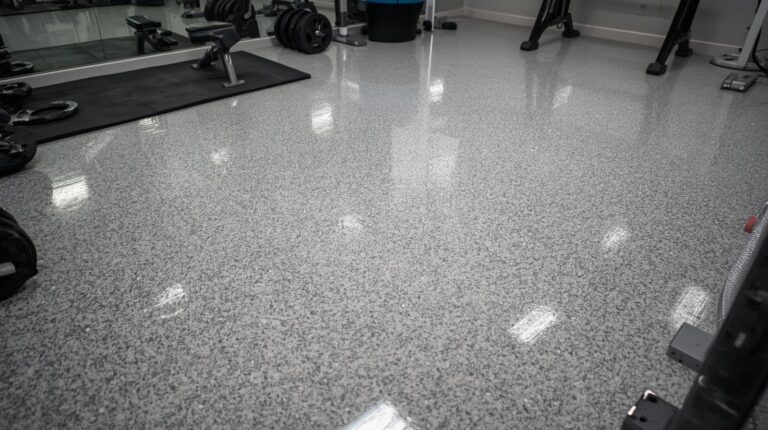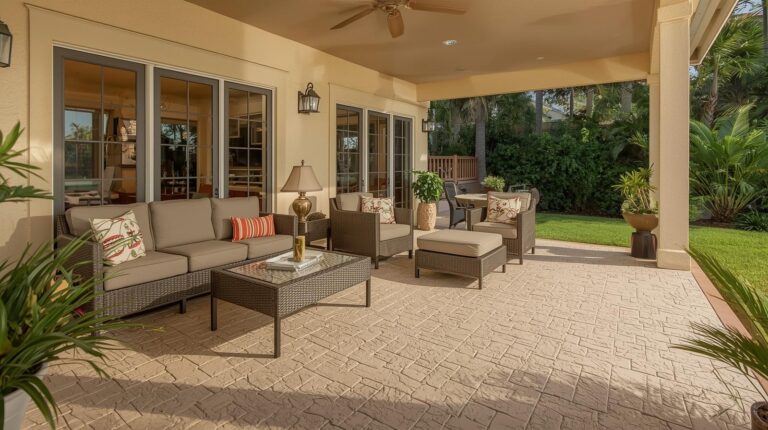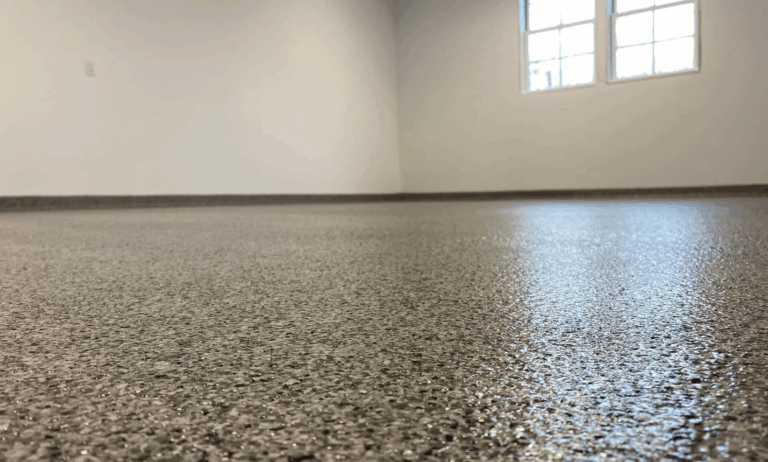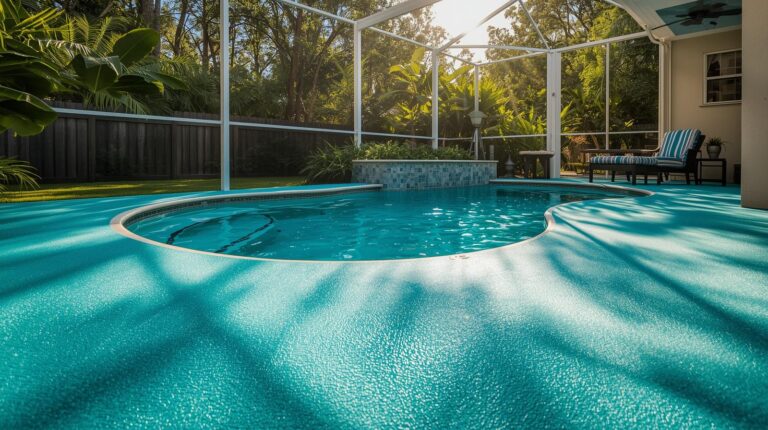Complete the Form to Save Up to $600!
“Choosing the right finish for your patio isn’t just about aesthetics—it’s about performance in Florida’s heat, humidity, and hurricanes.” — Concrete Science, Fort Myers, FL
When it comes to upgrading your outdoor space, one question comes up again and again:
Should you go with a patio coating or a concrete stain?
In Fort Myers, where we face high UV exposure, salt air, and frequent rain, making the right decision can significantly impact the look and longevity of your patio. At Concrete Science, we help homeowners make smart choices by explaining the difference between patio coatings and concrete staining, and when to use each.
🔍 Understanding the Basics: Coatings vs. Staining
✅ Concrete Coatings (Resurfacing or Overlay Systems)
A patio coating is a protective and decorative layer applied over the surface of existing concrete. It typically includes materials like epoxy, polyurea, or polyaspartic products. These coatings bond chemically and physically with the surface to form a durable, sealed finish that resists wear, UV rays, water, and chemicals.
Best For:
- High-traffic patios
- Weather-exposed outdoor spaces
- Homes near the coast or with pool decks
✅ Concrete Staining
Concrete staining involves applying an acid-based or water-based solution that penetrates the surface and chemically reacts with the concrete. It creates a translucent, variegated finish with natural, earthy tones.
Best For:
- Homeowners wanting a unique, marbled effect
- Interior patios or covered outdoor areas
- Budget-conscious upgrades
🌴 How Fort Myers Weather Affects Your Choice
☀️ UV Exposure
Florida’s sun is relentless, and over time, it can fade stained concrete—especially if the patio is unshaded. High-quality UV-stable coatings like polyaspartic or polyurea offer superior protection against fading, chalking, or yellowing.
“For homes with open patios or pool decks in Fort Myers, coatings offer long-term color retention and UV resistance that stains can’t match.” — Concrete Science Installation Team
💧 Moisture & Humidity
Frequent rain and high humidity create ideal conditions for mold, mildew, and surface degradation. Coatings form a non-porous barrier, making them much more moisture-resistant than stains.
🌊 Salt Exposure
For coastal homes, salt in the air and occasional splash from seawater or pools can deteriorate untreated concrete over time. Coatings offer a salt-resistant shield, while stains typically require more frequent sealing and maintenance.
⚒️ Durability and Maintenance
Feature Concrete Coating Concrete Staining
Surface Protection High – protects against wear, chemicals, and water Low – aesthetic only; no protection
UV Resistance Excellent (with UV-stable formulas) Fair to poor (requires sealing)
Slip Resistance Customizable with additives Natural texture remains
Maintenance Needs Low (reseal every 5–10 years) Medium (reseal every 1–2 years)
Design Versatility High – textures, flakes, metallics, colors Moderate – earth tones only
🧱 Design Goals: Which Finish Matches Your Style?
- Want a sleek, modern look with options like metallic or terrazzo-style flake? → Choose a coating.
- Want a natural, aged, or Tuscan finish that blends with landscaping? → Go with staining.
- Want to customize slip resistance, gloss level, and color? → Coating is your best bet.
- Need a quick refresh on a budget? → Staining might be the more affordable choice upfront.
💬 Expert Tip
“Many Fort Myers homeowners combine both—staining for the base color and a clear protective coating on top for performance. This hybrid approach delivers the best of both worlds.” — Lead Installer at Concrete Science
💡 FAQs
Is concrete coating better than staining?
Yes, concrete coatings provide more protection, customization, and longevity, especially in Florida’s harsh outdoor conditions. Stains are mostly decorative and require frequent maintenance.
Does stained concrete need to be sealed?
Absolutely. To protect against UV rays, water, and wear, all stained concrete should be sealed—and resealed every 1–2 years, especially in humid or sunny climates like Fort Myers.
Can I apply a coating over stained concrete?
Yes, a clear or tinted coating can be applied over a stain—as long as the surface is clean, sealed correctly, and the materials are compatible.
🎯 Final Recommendation: What’s Best for Fort Myers Patios?
For long-term durability, low maintenance, and customization in sun-exposed or high-moisture areas, patio coatings are the superior choice.
For budget-conscious or low-traffic patios, staining offers beautiful results but with shorter lifespans and higher maintenance.
🔨 Ready to Upgrade Your Patio in Fort Myers?
At Concrete Science, we offer tailored solutions for every style and budget. Whether you’re exploring decorative concrete staining or a high-performance patio coating, our expert team will walk you through the options—and deliver a surface that lasts.
📞 Contact us for a free patio consultation and estimate



